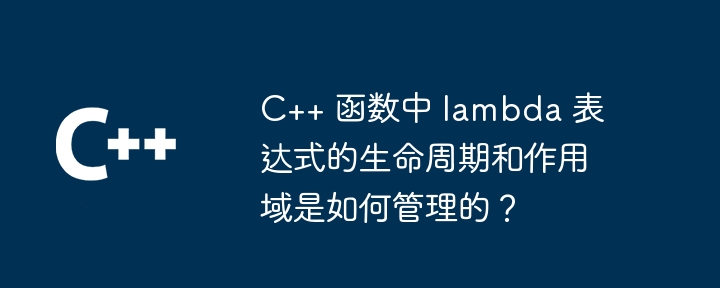Home >Backend Development >C++ >How are the lifecycle and scope of lambda expressions in C++ functions managed?
How are the lifecycle and scope of lambda expressions in C++ functions managed?
- WBOYWBOYWBOYWBOYWBOYWBOYWBOYWBOYWBOYWBOYWBOYWBOYWBOriginal
- 2024-04-25 14:24:01711browse
Lambda expressions have unique functional cycles and scope management in C: Life cycle: The life cycle of the lambda expression is related to the lifetime of the captured variable, and the lambda also expires when the variable is destroyed. Scope: A lambda can only access variables within its definition scope, including local variables, global variables, and external variables captured by reference or pointer. Practical cases: lambda expressions are widely used in event processing, sorting algorithms, data processing and other scenarios.

Lifecycle and scope management of Lambda expressions in C functions
Lambda expressions are powerful anonymous functions in C. Their lifetime and scope are different from ordinary functions, and understanding these differences is critical to using lambda expressions effectively.
Lifecycle
The lifetime of a lambda expression is related to the lifetime of the captured variable. Variables captured by a lambda expression are destroyed when they leave the scope in which they were defined. For example:
int main() {
int x = 10;
auto lambda = [x] {
return x; // 捕获了 x
};
//... 这里 lambda 表达式仍然有效
x = 20; // 修改 x
//... lambda 表达式不再有效,因为 x 已经销毁
}Scope
The scope of a lambda expression is governed by closure rules. A closure is a function or lambda expression that has a copy of a variable defined in its outer scope. A lambda expression can only access variables in its definition scope, including:
- Local variables: Variables declared within the function in which the lambda expression is defined.
- Global variables: Variables declared in other parts of the program.
- External variables: Variables captured by reference or pointer.
The following examples illustrate the scope of lambda expressions:
int y = 20;
int main() {
auto lambda = [y]() {
return y; // 只能访问 y
};
//... 这里 lambda 表达式仍然有效
int y = 30; // 创建新的局部变量 y
auto result = lambda(); // 返回 20,外部作用域的 y
}Practical cases
Lambda expressions can be used effectively in a variety of scenarios:
- Event handler: Register callback functions for events, such as button clicks or window size change events.
-
Sort algorithm: Use lambda expression to specify the sort order, for example
std::sort(arr.begin(), arr.end(), [](int a, int b) { return a < b; }). -
Data processing: Use lambda expressions as function parameters to transform or filter data, such as
std::transform(vec.begin(), vec.end() , vec.begin(), [](int x) { return x * 2; }).
The above is the detailed content of How are the lifecycle and scope of lambda expressions in C++ functions managed?. For more information, please follow other related articles on the PHP Chinese website!

